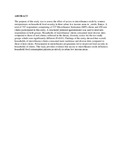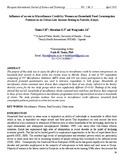| dc.contributor.author | Mugure, Faith Thuita | |
| dc.contributor.author | Mwadime,K N | |
| dc.contributor.author | Wangombe,J K | |
| dc.date.accessioned | 2013-07-18T08:41:25Z | |
| dc.date.available | 2013-07-18T08:41:25Z | |
| dc.date.issued | 2013 | |
| dc.identifier.citation | Thuita F.M, Mwadime RKN, WJ(2013). 2013. Influence of access to microfinance credit by women on household food consumption patterns in an urban low income setting in Nairobi, Kenya. . European International Journal od Science and tecnology. Vol 2(NO. 3):79-88. | en |
| dc.identifier.uri | http://erepository.uonbi.ac.ke:8080/xmlui/handle/123456789/48750 | |
| dc.description.abstract | The purpose of this study was to assess the effect of access to microfinance credit by women entrepreneurs on
household food security in three urban low income areas in airobi, Kenya. A total of 787 respondents
comprising of 337 Microfinance Institution (MFI) clients and 450 non clients participated in this study. A
structured pretested questionnaire was used to interview respondents in both groups. Households of
microfinance clients consumed more diverse diets compared to those of non clients, reflected in the dietary
diversity scores for the two study groups which were significantly different (P<0.01). Findings of the study
showed that overall, households of microfinance clients consumed more nutritious and diverse diets compared
to those of non clients. Participation in microfinance programmes led to improved food security in households
of clients. The study provides evidence that access to microfinance credit influences household food
consumption patterns positively in urban low income areas. | |
| dc.language.iso | en | en |
| dc.publisher | University of Nairobi | en |
| dc.title | Influence of access to microfinance credit by women on household food consumption patterns in an urban low income setting in Nairobi, Kenya | en |
| dc.type | Article | en |


